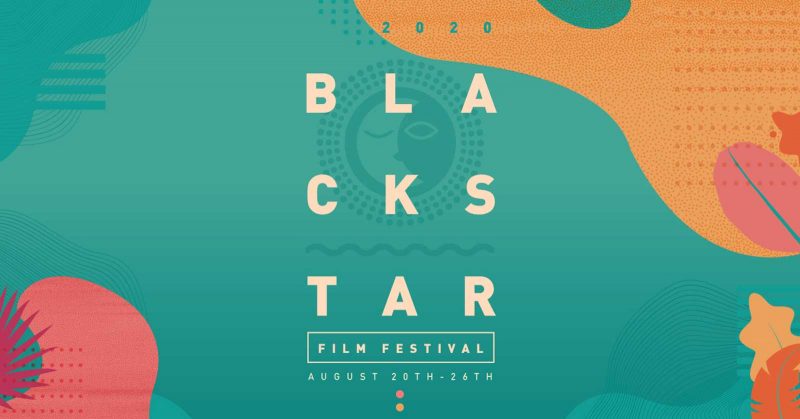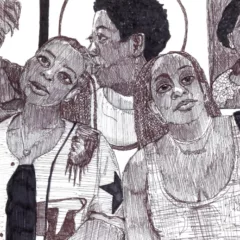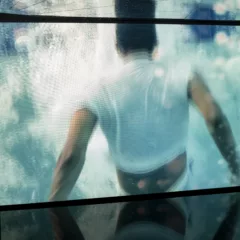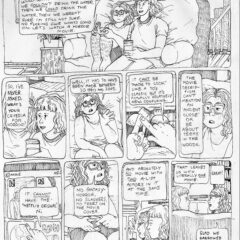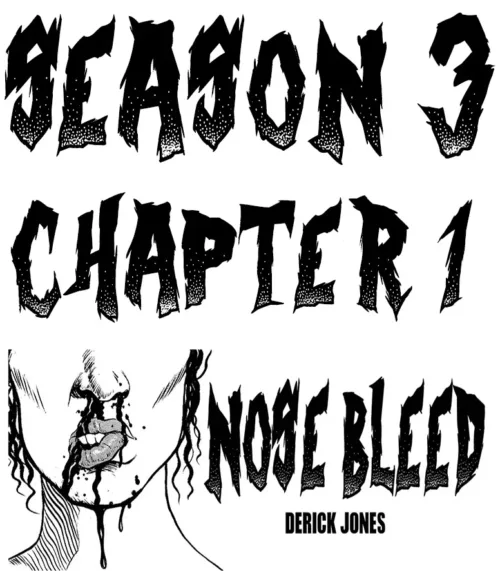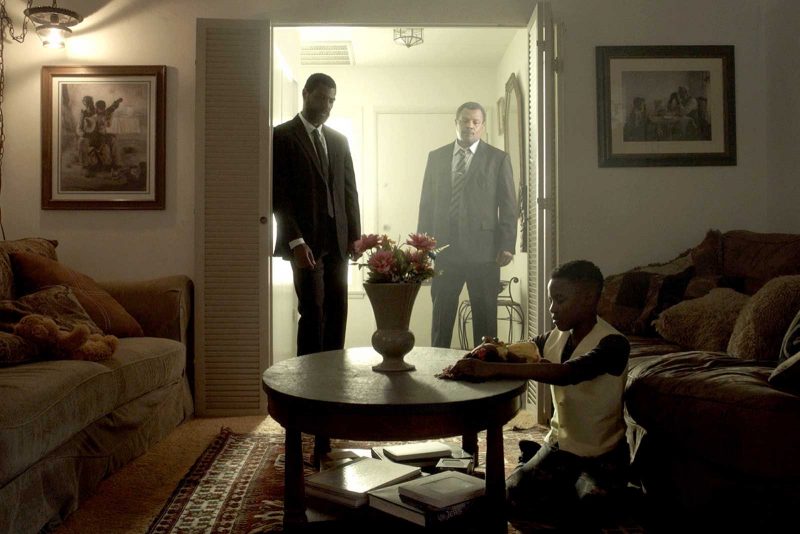
Like many other Philadelphians, I was happy to hear that BlackStar film fest was still happening this year. The first time I ever heard about the festival I was just preparing to leave Philly for Oakland. I’d daydream about saving up enough money to fly home for the week and catch the festival. I’ve gone a few times since being back to the city. This year I’ll be able to attend more screenings than any years before (as much as the magic of attending a screening in person will be missed, from the sound, the darkness, the expressions of others around you). I am interested in how moving online may make the experience more accessible for a wider audience this year.
For those unfamiliar with the festival, BlackStar started out as a four day festival in 2012 comprised of films from filmmakers of the African Diaspora that has bloomed into an organization with programming throughout the year, from workshops, panels, labs, to a new film journal SEEN, in addition to the annual summer festival. Here’s a trailer for the festival the team made this year.
Just a few weeks ago I was able to interview Maori Karmael Holmes, Artistic Director, CEO and founder of BlackStar, whom since we spoke has been appointed Curator-at-Large for Film at the Annenberg Center for the Performing Arts and Mediamaker-in-Residence at the Annenberg School for Communication at the University of Pennsylvania. We congratulate her on this and look forward to what is to come! We chatted for about 45 minutes, about the origins of the festival and what we can expect to see this year, and the future of BlackStar.
reek bell: Where did the name BlackStar originate?
Maori Karmael Holmes: I was talking with a friend, who is Ghanaian, they were talking about the Black star as a symbol of Pan-Afircan unity. Black Star was the name of Marcus Garvey’s shipping line that was transporting African folks from the US back to the African Shore, it’s a symbol for the soccer team in Ghana, it’s the center of Ghana’s Flag as the first African nation to regain their independence (from European colonization). Talking through all of that with my friend, talking about film being the art of light, talking about stars and cosmos and blackness, it just really made sense! You think about Sundance, you think about these things that have such light in their names. It just made sense.
r.b: I understand of course in response to the COVID-19 pandemic the festival is going to be online, which I wanted to ask some questions about. But aside from that aspect, I’m curious how the COVID-19 pandemic has affected BlackStar as an organization?
M.K.H: We thought we weren’t going to be affected by it initially. When quarantine just began it seemed like life would resume to a normalcy of some kind by late summer. So in the beginning of it we were taking our time, waiting to see. It became obvious over time that we benefited from being later on. Luckily, alot of folks have been interested because we had that benefit of additional time for the world to change.
The uprising 6 weeks ago started another shift of energy. As brands have scrambled to prove how woke they are and be attached to black folks we are getting some meetings that we haven’t got before from high profile brands. It is a direct relation to the murder of George Floyd and the aftermath. I’m kind of shocked. We’re kind of waiting to see, we’re not running after them, we’re not anybody’s token. But I don’t want to be dismissive of something that could be transformative of the future of the organization. We’re taking meetings.
r.b: Back to the platform going online this year through cinesend. Can you tell me a little bit more about them and how BlackStar started a partnership with them this year?
M.K.H: Another benefit of us happening later we got to see what some of the spring festivals we’re doing. There were some that had to cancel of course like Tribeca and South by Southwest,as they were happening right as quarantine began, and then there were other festivals that found ways to pivot, Images in Toronto, Hot Docs in Toronto, and CPH Docs in Copenhagen. Just looking at some of these other festivals and what they were doing we started trying to think about what might work for us. I have a Technical Director, Lendl, and our Communications Director Imran, the two of them spent a lot of time, and I even participated in some demos myself with different companies to try to get a sense out of what makes sense for us financially. The goal was to keep people’s films as secure as possible because a lot of people have rightful fears around piracy. We also wanted to figure out a platform that would give us some sort of shared experience because that’s really the magic of the festival. That’s something you can’t replicate online. Being able to have some of that created or fostered is something that we were looking for as well. So cinesend seemed to be pretty secure, offers us the ability to Geo block as requested, offers us the ability to do timed screenings so they are not available on demand, it is an event, we liked the ticketing options that they offered, all of that felt really great.
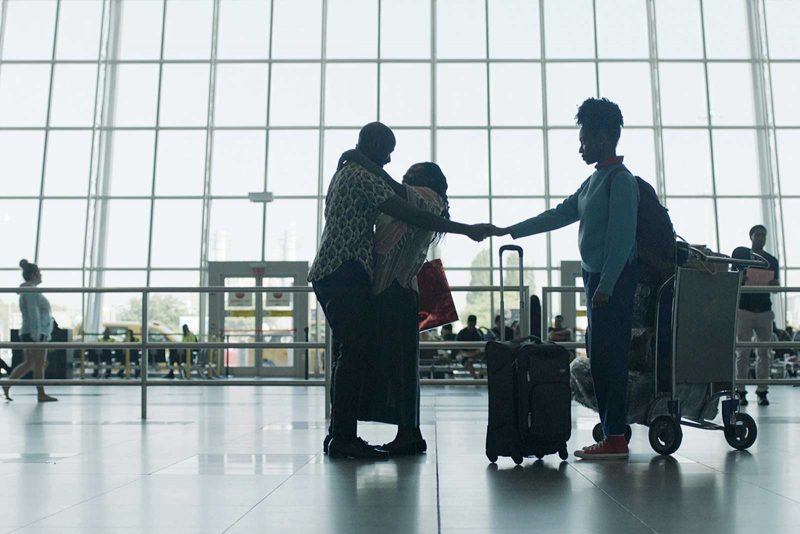
r.b.: With the shifting of the format, do you feel like this may increase engagement and accessibility?
M.K.H: It’s possible! I mean I don’t know. We’ve never done this, I have no way to have any sense of this. But what I’m hoping is it will allow us to have more global engagement. That’s something we are looking forward to. It’s definitely not going to be the same kind of financial impact. We generally sell tickets for $12, and festival passes for $250 so that obviously is revenue from 10,000 people. We won’t have that, we made a decision to make the passes much cheaper. So we’re selling five dollar day passes that feels on par with what people pay for streaming services. The other reason for that, that one of our staff members brought up is that does make it more accessible globally. Five dollars may not seem a lot to some people here but that’s a lot of money in Mexico, you know that’s a lot of money in Kenya. We have filmmakers from those places, it makes it more accessible globally too.
r.b.: I remember reading last year there was some uncertainty in whether the festival would be remaining in Philly. Have there been any developments on that, I’m curious about its future in Philly?
M.K.H: It was going to be announced in March, we will be launching the festival at the Annenberg Center for the next three years. That is still the plan for 2021, and 2022 should we be able to do public events again.
r.b.: Glad to hear that! Now going into the catalogue of films for this year’s festival which is at about 90 films, what is the selection process like?
M.K.H: We have the program committee that’s formed. This year for the first time we put together a program committee for each genre, so there were 3-5 people for each of the genres who watched the films in that category and made decisions for that category, and then me and our program director then made final decisions about which films we wanted to program.
r.b.: Does BlackStar do any outreach to film makers, or is the festival submission based?
M.K.H: We do some solicitation, it’s about 15%.
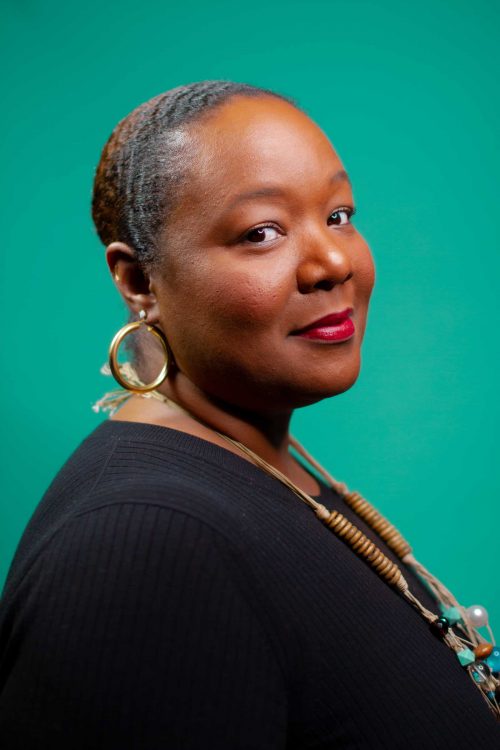
r.b.: What do you envision for the future of BlackStar? There’s so much that we don’t know about the future of public events. What do you hope to integrate into the future of BlackStar?
M.K.H: The festival is only a part of the project of BlackStar generally. This year we hired almost full time staff, we have a team of 5 people including myself. We haven’t had that before, it’s been a contract basis since the beginning, the first year was a volunteer basis, and then it’s been a contract basis since then. We have gotten some support, and have expanded to become BlackStar Projects.
We’re launching a journal this summer that will come out the same time as the festival. We’re planning a film maker lab for Philadelphia based filmmakers, we’re planning a film maker seminar next spring in Baltimore and eventually would like to have a fund for filmmakers and to do a streaming distribution platform.
r.b.: With the journal what kinds of things should we expect to see featured?
M.K.H: “ A film and visual culture journal, by critics of color about filmmakers of color.” Really trying to address what I feel like is a loss of contemporary analysis by BIPOC folks for BIPOC folks. There isn’t one place that you can expect to find that content, and really contemporary. I wanted to have something that is high level writing but also accessible, also thinking about popular culture in addition to the art world and high art film. That’s our goal.
(SEEN, the film journal we discussed SEEN’s first issue is now available for pre-order! )
reek bell: Finally, Could you speak a little bit about what the first year of the festival looked like?
Maori Karmael Holmes: I had been curating a film and social justice series called KinoWatt at the Asian Arts Initiative with another film maker curator Sara Zia Ebrahimi. She wanted to take the summer off and I thought since I would be focusing on doing something on my own I had been really interested in doing something focused on Africa, I didn’t know what that’d be. That year there were a number of festivals and I think there was a renewed sense of contemporary Africa and African Diaspora. Largely in Brooklyn, and I was seeing other things happening in London and just wanting to do something in that space.
I started thinking about it as a “microfestival”, which is what I called it. A one day celebration, thinking it was going to be multiple disciplines. I started with film, I started putting together a list of films that hadn’t screened In Philadelphia that were made by makers of the African Diaspora and very quickly I had 30 films. It was crazy, films that hadn’t come to the city through a festival or other repertory. It became clear I had a film festival on my hands, it became clear I didn’t even bother with the other disciplines at that point. Then I started thinking about names, naming is such a tough thing, and then it just comes to you.
r.b.: What were some of your favorite memories of that first year?
M.K.H: I don’t know, that was so long ago…. I mean people came, like 1500 people came that first year. That felt good. We had really incredible audiences. Ava DuVernay came that first year, kind of right as her star was rising. She shared with the audience an excerpt of Middle of Nowhere and that felt like a really beautiful moment. We screened Byron Hurt’s Soul Food Junkies as our closing film. Byron and I had had films on the festival circuit that were often paired together, back in 2006 and having him be a part of the festival was really great. Part of what led me to this work was being on the festival circuit and meeting all these other filmmakers and programmers that I still have relationships with to this day so that was also a beautiful moment. Ava had been in another festival I had run called Black Lily and so that is how we got in touch with her for the festival. So in some ways BlackStar has been a culmination of lots of different work that I’ve been doing. So I think back to those two moments are really important ones. I think to that first night, Just finishing it that first year, the closing night after Byron’s film, I remember the staff presented me with flowers and it was so overwhelming, that it happened.
BlackStar Film Fest is open NOW! The festival will be held August 20th-August 26th with a catalogue of about 90 films available, you can find the schedule here. Tickets are still available! Honoring the experience of attending a screening, the films will be available to screen at set times so check out the schedule and get your tickets. BlackStar has even partnered with the Philadelphia Parks Department for a drive-in experience, the films Be Water (8/21), The Forty-Year-Old Version (8/22), and Miss Juneteenth (8/23) are scheduled to screen at to screen in Fairmount Park, these screenings are of course more limited in their attendance and festival day passes do not guarantee admission!
I’ll be watching as many films I can and I’ll be back after the festival with some highlights and reviews. I implore you all to honor Black August and supporting Black liberation work in your communities and celebrate the creations of Black Artists.
